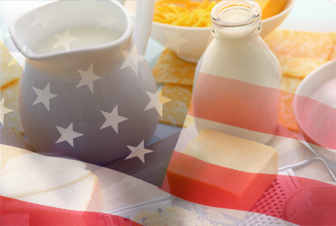 Forty-two states currently allow access to raw milk through statute, regulation, or policy. In the 2017 session, legislators have introduced raw milk bills in several states where any raw milk sales or distribution is illegal; in addition, a number of other states have introduced legislation that would expand legal access. The movement towards raw milk legalization in all 50 states continues. Bills before the legislatures include:
Forty-two states currently allow access to raw milk through statute, regulation, or policy. In the 2017 session, legislators have introduced raw milk bills in several states where any raw milk sales or distribution is illegal; in addition, a number of other states have introduced legislation that would expand legal access. The movement towards raw milk legalization in all 50 states continues. Bills before the legislatures include:
ALASKA
House Bill 46 (HB 46) would legalize sales of raw milk and raw milk products direct to the final consumer as long as the “principal display panel” on the product states that the milk is not pasteurized and “may cause health concerns” and if the producer complies with any other state requirements for the sale of raw milk.
Raw milk is one of several matters related to food and agriculture that is covered in the bill. HB 46 has been assigned to three different House committees: the Community and Regional Affairs, the Resources, and the Finance Committees.
HAWAII
Hawaii has no fewer than six bills (only three listed here) that would allow for the sale and distribution of raw milk. The bills include:
Senate Bill 162 (SB 162) would allow the direct sale of raw pet milk from a farm to a consumer who is an owner of a pet animal; farms selling milk must register with the state Department of Health and must comply with labeling requirements. The bill also allows the sale of any other raw dairy product as pet food.
SB 162 passed out of the Senate Committee on Agriculture and Environment and is now before the Committee on Commerce, Consumer Protection and Health. The Hawaii Department of Health strongly opposed the bill, and as a result the effective date of the measure has been pushed back to July 1, 2050 to “encourage further discussion” according to a letter from the chair of the Committee on Agriculture and the Environment.
Senate Bill 644 (SB 644) would allow the sale of raw milk and raw milk products through a subscription program from the farm direct-to-consumer if various requirements are met. The requirements include farms registering with the state, complying with labeling and recordkeeping requirements, and receiving a raw milk subscription program permit from the state. Subscribers must sign a “waiver of understanding” recognizing that the milk is not pasteurized and sign a pledge to buy a future portion of raw milk and raw milk products produced by a Hawaii raw milk producer.
SB 644 has been assigned to both the Agriculture and Environment Committee and the Commerce, Consumer Protection and Health Committee.
Senate Bill 1167 (SB 1167) would allow the distribution of raw milk and raw milk products through herdshare agreements. Those purchasing an ownership interest in a dairy animal must sign a waiver of understanding that the milk and milk products received are not pasteurized.
SB 1167 has been assigned to both the Agriculture and Environment Committee and the Commerce, Consumer Protection and Health Committee.
ILLINOIS
House Bill 2466 (HB 2466) would give the Illinois Department of Public Health (IDPH) the authority to issue rules allowing the delivery of raw milk by dairies that are permitted through IDPH. Current law allows permitted dairies to sell raw milk only on the farm premises. For over 30 years, IDPH allowed the unregulated on-farm sale of raw milk, but last summer regulations subjecting the raw milk dairies to permitting and inspection requirements went into effect. Only two dairies have obtained permits so far.
IOWA
Senate File 287 (SF 287) would allow sales of ungraded raw milk direct to the final consumer. Current law requires that only Grade A pasteurized milk and milk products be sold to the final consumer; Iowa is one of the remaining states prohibiting any raw milk distribution. SF 287 has been assigned to the Senate Agriculture Committee.
MASSACHUSETTS
Senate Number 442 (S.442), an agricultural omnibus bill includes provisions that would officially legalize herd share agreements and would allow the off-farm delivery of raw milk by licensed dairies.
Under the bill, farmers with no more than 12 lactating cows, goats, or combination of cows and goats can enter into herdshare agreements with those wanting to obtain raw milk. There must be a written contract that includes a statement that the raw milk is not pasteurized nor subject to inspection by the state Department of Health nor the Massachusetts Department of Agricultural Resources (MDAR), and that the milk is subject to limited testing by the MDAR. Distribution is limited to on the farm and the farmer must keep records of when a shareholder receives milk and shall maintain those records for at least 60 days. MDAR has power to issue rules on testing but cannot require testing more frequently than once every two months.
S.442 allows for a licensed raw milk farmer to deliver raw milk to a consumer the farmer has a contractual relationship with, including through the farmer’s agent and through a community supported agriculture (CSA) delivery system. No delivery site can be in a retail setting except for CSA delivery. The bill gives MDAR power to issue regulations governing delivery; the regulations must allow for non-mechanical refrigeration. S.442 has been assigned to the Joint Committee on Environment, Natural Resources and Agriculture.
MONTANA
An amended version of House Bill 325 (HB 325) has passed out of the House Agriculture Committee and is now up for a vote on the House floor. The amended version of the bill would allow the direct-to-consumer sale of raw milk and raw milk products from producers with no more than 5 cows or 10 goats or sheep. The only requirement is that producers register with the state Department of Livestock (DOL).
The original bill would have allowed the on-farm sale of raw milk and raw milk products to consumers by producers with no more than 10 cows or 20 goats or sheep. Producers had to obtain a small herd permit from DOL, and there were testing and labeling requirements, as well. The original version of HB 325 would also have officially legalized herd share agreements.
NEW JERSEY
Assembly Bill 696 (A 696) passed out of the Assembly Agriculture and Natural Resources Committee in December 2016 but has not yet been scheduled for a floor vote in the General Assembly. The legislature is in the second year of a two-year session. The bill was also introduced the prior two sessions.
A 696 allows for the on-farm sale of raw milk and raw milk products if the producer has a permit issued by the state Department of Agriculture. There is a requirement that the label for any raw dairy product contain the statement, “Raw Milk Is Not Pasteurized and May Contain Organisms that Cause Human Disease”; there must also be a sign on the farm with a similar statement. There are herd health and milk testing requirements; producers are responsible for the costs of the latter.
A 696 recognizes the legality of herd share agreements and states that no raw milk permit is required for the distribution of milk through a herdshare contract.
RHODE ISLAND
Two raw milk bills have been introduced in the Rhode Island legislature this session. Senate Bill 247 (SB 247) empowers the state milk commission to issue rules governing the distribution and sale of raw milk and cream within the state. SB 247 requires that raw milk only be available for sale only five days after the date of production. The bill also requires warning statements on the label and on a sign where the milk is sold. A license is required for anyone selling more than twenty quarts of milk or cream per day to consumers.
Senate Bill 248 (SB 248) legalizes herd share agreements by exempting them from any requirements of the state Milk Sanitation Code. The exemption applies to the “transfer or exchange of raw milk between persons who are parties to the same shared animal ownership agreement.”
TEXAS
House Bill 57 (HB 57) allows permitted raw milk producers or their employees or agents to sell raw milk and raw milk products at the “permit holder’s place of business”, the consumer’s residence, or a farmers market. Current law only allows permitted producers to sell on the farm. The bill has sections regarding labeling, handling, and transport of raw milk and availability of records on raw milk testing. A warning statement is required on the labels. Raw milk cannot be sold later than the fifth day after the date the container was filled; there are temperature requirements for the transport of raw milk but the state Department of Public Health is not allowed to prescribe the method used for compliance, such as refrigeration. A producer may contract with another person for the transport but is still legally responsible for any violations of state law during the delivery and transport.
The Farm-to-Consumer Legal Defense Fund has provided consultation on several of the bills listed here. Further updates on the status of bills will be posted as events warrant.
YOUR FUND AT WORK
 Services provided by FTCLDF go beyond legal representation for members in court cases.
Services provided by FTCLDF go beyond legal representation for members in court cases.
Educational and policy work also provide an avenue for FTCLDF to build grassroots activism to create the most favorable regulatory climate possible. In addition to advising on bill language, FTCLDF supports favorable legislation via action alerts, social media outreach, and the online petition service.
You can help FTCLDF by becoming a member or donating today.

 Anyone wanting to make a contribution to support the work of FTCLDF can make a donation online or send a check to:
Anyone wanting to make a contribution to support the work of FTCLDF can make a donation online or send a check to:
FTCLDF
8116 Arlington Blvd, # 263
Falls Church, VA 22042
Prefer to make a tax-deductible donation? Donate online here.
You may also contact us by email at [email protected] or call 703-208-FARM (3276). Thanks for your support.